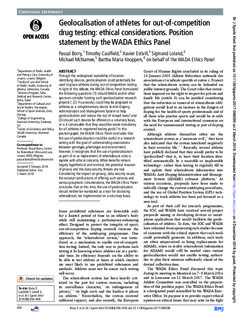| dc.contributor.author | Borry, Pascal | |
| dc.contributor.author | Caulfield, Timothy | |
| dc.contributor.author | Estivill, Xavier | |
| dc.contributor.author | Loland, Sigmund | |
| dc.contributor.author | McNamee, Michael | |
| dc.contributor.author | Knoppers, Bartha Maria | |
| dc.date.accessioned | 2019-01-03T08:51:50Z | |
| dc.date.available | 2019-01-03T08:51:50Z | |
| dc.date.created | 2018-10-11T11:48:13Z | |
| dc.date.issued | 2018 | |
| dc.identifier.citation | British Journal of Sports Medicine. 2018, 52 (7), 456-459. | nb_NO |
| dc.identifier.issn | 0306-3674 | |
| dc.identifier.uri | http://hdl.handle.net/11250/2578873 | |
| dc.description.abstract | Through the widespread availability of location-identifying devices, geolocalisation could potentially be used to place athletes during out-of-competition testing. In light of this debate, the WADA Ethics Panel formulated the following questions: (1) should WADA and/or other sponsors consider funding such geolocalisation research projects?, (2) if successful, could they be proposed to athletes as a complementary device to Anti-Doping Administration and Management System to help geolocalisation and reduce the risk of missed tests? and (3) should such devices be offered on a voluntary basis, or is it conceivable that they would be made mandatory for all athletes in registered testing pools? In this position paper, the WADA Ethics Panel concludes that the use of geolocalisation could be useful in a research setting with the goal of understanding associations between genotype, phenotype and environment; however, it recognises that the use of geolocalisation as part of or as replacement of whereabouts rules is replete with ethical concerns. While benefits remain largely hypothetical and minimal, the potential invasion of privacy and the data security threats are real. Considering the impact on privacy, data security issues, the societal ramifications of offering such services and various pragmatic considerations, the WADA Ethics Panel concludes that at this time, the use of geolocalisation should neither be mandated as a tool for disclosing whereabouts nor implemented on a voluntary basis. | nb_NO |
| dc.language.iso | eng | nb_NO |
| dc.subject | doping | |
| dc.title | Geolocalisation of athletes for out-of-competition drug testing: Ethical considerations. Position statement by the WADA Ethics Panel | nb_NO |
| dc.type | Journal article | nb_NO |
| dc.type | Peer reviewed | nb_NO |
| dc.description.version | publishedVersion | nb_NO |
| dc.rights.holder | This is an Open Access article distributed in accordance with the Creative Commons Attribution Non Commercial (CC BY-NC 4.0) license, which permits others to distribute, remix, adapt, build upon this work non-commercially, and license their derivative works on different terms, provided the original work is properly cited and the use is non-commercial. See: http://creativecommons.org/licenses/by-nc/4.0/ | nb_NO |
| dc.source.pagenumber | 456-459 | nb_NO |
| dc.source.volume | 52 | nb_NO |
| dc.source.journal | British Journal of Sports Medicine | nb_NO |
| dc.source.issue | 7 | nb_NO |
| dc.identifier.doi | 10.1136/bjsports-2017-098299 | |
| dc.identifier.cristin | 1619622 | |
| dc.description.localcode | Seksjon for kultur og samfunn / Department of Cultural and Social Studies | nb_NO |
| cristin.unitcode | 150,33,0,0 | |
| cristin.unitname | Seksjon for kultur og samfunn | |
| cristin.ispublished | true | |
| cristin.fulltext | original | |
| cristin.qualitycode | 2 | |
